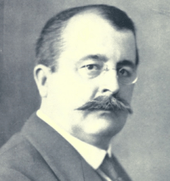John Quiller Rowett


John Quiller Rowett (1876–1924) was a British businessman and philanthropist. He made a fortune in the wines and spirits industry as Chairman and Managing Director of Rowett, Leakey and Co., and a director of other companies.
He had a desire to do more than make money and in the years after World War I he was a notable contributor to public and charitable causes. A schoolfriend of Sir Ernest Shackleton at Dulwich College, Rowett was the sole financial backer (to the tune of £70,000) for Shackleton's final Antarctic venture, the Shackleton-Rowett Expedition of 1921–22, during which Shackleton died.[1]
After Shackleton's death, Rowett was instrumental in acquiring the whaleboat James Caird, in which Shackleton had made his famed 1916 open-boat voyage from Elephant Island to South Georgia, and presenting it to Dulwich College.[2] He was a co-founder of the Rowett Research Institute, an animal nutrition research laboratory now part of the University of Aberdeen,[3] and was also a benefactor to hospital charities.[1]
On 1 October 1924, believing his business affairs to be on a downturn, Rowett took his own life.[4]
A mountain on Gough Island, a remote volcanic island of the Tristan da Cunha group in the South Atlantic, is named to honour him. After Shackleton's death in South Georgia, the expedition visited Gough Island in the tiny (125-ton) Quest, with parties going ashore from 28 May 1922 for a few days. When the expedition climbed and named Mount Rowett (made up of four peaks) it was thought to be the highest point on the island, at 836 metres. However over thirty years later Edinburgh Peak at 910 metres was found to be the highest point by the Gough Island Scientific Survey.
Notes and references
- 1 2 Huntford, pp. 682–84
- ↑ "About the Society". The James Caird Society. Retrieved 10 December 2008.
- ↑ "About the Institute". University of Aberdeen. Retrieved 5 November 2008.
- ↑ "The Agricultural Association, the Development Fund, and the Origins of the Rowett Research Institute" (PDF). www.bahs.org.uk. Retrieved 5 November 2008. Footnote, p. 60
Sources
- Huntford, Roland (1985). Shackleton. London: Hodder & Stoughton. ISBN 0-340-25007-0.
- "About the Institute". University of Aberdeen. Retrieved 20 February 2013.
- "The Agricultural Association, the Development Fund, and the Origins of the Rowett Research Institute" (PDF). www.bahs.org.uk. Retrieved 5 November 2008.
- The Tristan da Cunha Association Newsletter no. 53, August 2013